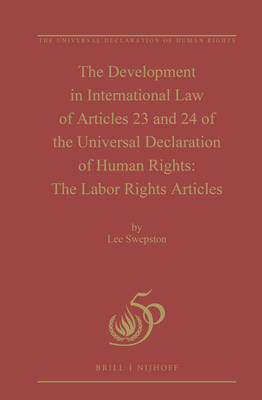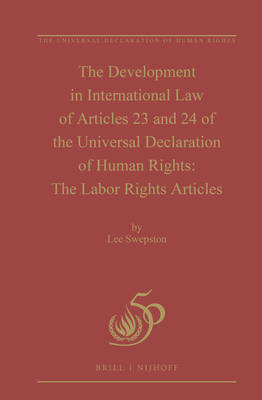
- Afhalen na 1 uur in een winkel met voorraad
- Gratis thuislevering in België vanaf € 30
- Ruim aanbod met 7 miljoen producten
- Afhalen na 1 uur in een winkel met voorraad
- Gratis thuislevering in België vanaf € 30
- Ruim aanbod met 7 miljoen producten
Zoeken
The Development in International Law of Articles 23 and 24 of the Universal Declaration of Human Rights: The Labor Rights Articles
Lee Swepston
€ 264,45
+ 528 punten
Omschrijving
The human rights enunciated in Articles 23 and 24 of the UDHR concern aspects of rights related to work. This part of international human rights law is often neglected in human rights textbooks and teaching, and indeed is often omitted from the work done by national human rights institutes and by NGOs concerned with human rights, as though it were a separate discipline that did not fall properly into the human rights field. This volume addresses this commonly held, but erroneous, misconception. There are aspects of labor-related rights in all the major human rights instruments and systems. While the International Labor Organization (ILO) is the primary body in this field, labor-related rights are also dealt with by the United Nations, the major regional organizations (such as the OAS and the EU), and the development banks (the World Bank and its regional counterparts). There are also provisions on labor rights in all the major international instruments, or they have been read to cover labor-related questions. This volume, which reviews the development and implementation of Articles 23 and 24 of the UDHR, will spend most attention on the ILO, which is the premiere organization in this field, both chronologically and substantively. However, since a thorough and complete picture of human rights cannot be drawn without considering labor-related rights as an aspect of the broader human rights canon, the rest of the international system will also be brought in.
This book is the fifth volume in The Universal Declaration of Human Rights Series. The Series will consist of approximately 20 volumes, each dealing with a substantive right (or group of rights) set forth in the Universal Declaration of Human Rights (UDHR). Each volume is authored by an expert in human rights generally and in the particular subject addressed. Without losing sight of the political context in which the implementation of human rights must occur, each book provides a comprehensive, legally-oriented analysis of the rights concerned, including an examination of the legislative history of the text of each right as adopted in 1948, the right's subsequent articulation and interpretation by international bodies and in subsequent international instruments, and a survey of state practice in defining and enforcing the right.
This book is the fifth volume in The Universal Declaration of Human Rights Series. The Series will consist of approximately 20 volumes, each dealing with a substantive right (or group of rights) set forth in the Universal Declaration of Human Rights (UDHR). Each volume is authored by an expert in human rights generally and in the particular subject addressed. Without losing sight of the political context in which the implementation of human rights must occur, each book provides a comprehensive, legally-oriented analysis of the rights concerned, including an examination of the legislative history of the text of each right as adopted in 1948, the right's subsequent articulation and interpretation by international bodies and in subsequent international instruments, and a survey of state practice in defining and enforcing the right.
Specificaties
Betrokkenen
- Auteur(s):
- Uitgeverij:
Inhoud
- Aantal bladzijden:
- 160
- Taal:
- Engels
- Reeks:
- Reeksnummer:
- nr. 5
Eigenschappen
- Productcode (EAN):
- 9789004244542
- Verschijningsdatum:
- 16/07/2014
- Uitvoering:
- Hardcover
- Formaat:
- Genaaid
- Afmetingen:
- 163 mm x 241 mm
- Gewicht:
- 408 g

Alleen bij Standaard Boekhandel
+ 528 punten op je klantenkaart van Standaard Boekhandel
Beoordelingen
We publiceren alleen reviews die voldoen aan de voorwaarden voor reviews. Bekijk onze voorwaarden voor reviews.











